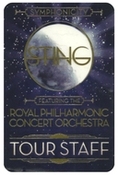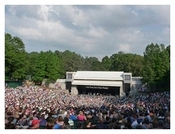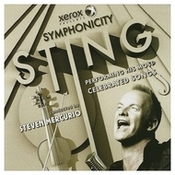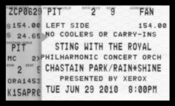
Symphonicity
Jun
29
2010
Atlanta, GA, US
Chastain Park Amphitheatrewith None
1
Sting's Symphonicity Tour is Coming to the Met (and Docking in a Town Near
You, Too)...
Vintage rockers and classical music shouldn't mix. But one thing I love about getting older is that most of the rockstars I adored when I was a teenager - especially those who now sing in front of 45-piece orchestras - are too grown-up for pretence. Even so, to say the pleasures of 'Symphonicity' (Sting's current tour with the Royal Philharmonic Concert Orchestra, coming to New York's Metropolitan Opera on July 13 and 14), took me by surprise is a gracious understatement.
I was 14 when The Police filmed their infamous 'Synchronicity' concert at Atlanta's Omni on a school night in November, 1983, and I was stuck on a family vacation in June, 1986, when the power trio reunited to share the bill with U2 for Amnesty's Conspiracy of Hope tour. Despite my never having attended a Police show during the band's heyday, trust me, I've seen Sting. I've watched him duck-walk with jazzy all-stars on 1985's 'The Dream of the Blue Turtles tour'; I've seen him play small theatres, big arenas, and outdoor sheds probably a dozen times over the years; I've seen him laugh, shake, jump, sweat, and cry on TV, in film, and onstage. But never before have I seen Sting play the fool.
The smiling showman who entertained me with hip-swaying and falsetto-flexing at Atlanta's Chastain Park Amphitheatre last night was a Sting unlike any other I've ever known - playful, witty, real. If after watching him engage the crowd during his show's opening number, 'If I Ever Lose My Faith In You', it was hard for me to believe the chatty cad in the spotlight was actually Sting, it's only because he, purveyor of 'Roxanne', 'Desert Rose' (the Jaguar commercial song), and the 1989 Broadway revival of Bertolt Brecht's 'Three Penny Opera', has made a career out of being self-serious - at least according to those music critics who consider his solo material lite-FM fodder.
Rock musicians touring with orchestras is absolutely nothing new - everyone from Metallica to The Decemberists has tried it. Peter Gabriel's 'Scratch My Back' tour made headlines this spring for its groundbreaking combination of orchestral arrangements and high-tech visuals. Yet when you put Sting in front of the Royal Philharmonic, it's an altogether different beast: dueting onstage with 'Symphonicity' guest vocalist Jo Lawry on 'Whenever I Say Your Name', he's too lithe to be a heavyweight storyteller ala Tom Waits; and when he reprises the Police hit 'Every Little Thing She Does Is Magic', he's still too cool to be a loveable fop like Paul McCartney.
He doesn't need artsy-fartsy video screens, because he's so damn entertaining, he's the only thing you want to see. The more Sting hammed it up with between-song banter (''I used to be against hunting until a fox killed every *****ing chicken in my chicken house,'' he says, just before launching into 'End of the Game'), the more I realized this was not an act, but a grace of age. Now that he's 58 (!), maybe Sting's starting to believe his rightful place in the music universe isn't merely in the upper echelon of the rock pantheon. When he commands a stage filled with dozens of world-class instrumentalists, it's obvious he fancies himself a damn good composer, too. And he's not wrong.
Sting can interweave major and minor-key moods like no one else, and some of the best performances in the show were songs that employed the technique, including 'Englishman in New York', 'Moon Over Bourbon Street', and 'Mad About You' - although the heroic efforts of the orchestra's clarinet soloist were no match for the lyrical soprano saxophone lines by Branford Marsalis on Sting's original recordings.
There are cynics (perhaps even Police drummer Stewart Copeland among them) who might allow Sting and his mammoth ensemble the indulgence of a little string-section swilling every now and then, if only for the bombast of the Prokofiev-inspired 'Russians' or to back up Dominic Miller's delicate guitar on 'Fragile'. Yet, those same folks might never guess that shoring up the Police's 'King of Pain' with a swell of violins, harp and flute would send its chorus ringing so clearly into the starlit summer sky (''That's my soul up there!''). Admittedly, a few lesser-known Sting songs ('I Hung My Head',) were a little snoozy set to such lush arrangements. Nevertheless, the bewitching 1999 rarity 'All Would Envy' had me searching YouTube at midnight in hopes of turning up an instant replay of this new live version and its hot trumpet solo.
There's no doubt Sting's yoga bod and brooding good looks (especially that smouldering semi-scowl, honed in magazine photo shoots over the decades) have contributed to his rep as the enigmatic hitmaker who left his fistfighting Police days behind to pursue a fantastical family life in the English countryside - all while working tirelessly on a songbook of technically-complex but otherwise breezy adult-format radio tunes. But that's not fair to the Sting whose 'A Thousand Years' enchanted me on a balmy Georgia evening as it reverberated around in a stone concert bowl surrounded by pines and magnolias.
Singing along with 6,000 people to an 'Every Breath You Take' encore as lightning flashed in the distance was pretty good, but the best moment came much earlier in the set, when Sting segued into 'Why Should I Cry For You?' with a few words about the how the death of his Newcastle fisherman father inspired the song's lyrics. Bows were raised and an unforgettable melody surged and ebbed to a time signature that evoked the rhythmic sloshing of the ocean - and the Royal Philharmonic bathed the audience in full symphonic sound. Afterward, Sting revealed that, in lieu of following his father's footsteps out to sea when he was a young man, he took a job as an entertainer on a cruise ship and ''****ing hated it!'' The crowd roared. By that time it was twenty minutes into 'Symphonicity' and too late to jump ship; anyone not rapt with this playful new Sting had better settle in for ride, because we'd already set sail.
(c) The Huffington Post by Kristi York Wooten
Vintage rockers and classical music shouldn't mix. But one thing I love about getting older is that most of the rockstars I adored when I was a teenager - especially those who now sing in front of 45-piece orchestras - are too grown-up for pretence. Even so, to say the pleasures of 'Symphonicity' (Sting's current tour with the Royal Philharmonic Concert Orchestra, coming to New York's Metropolitan Opera on July 13 and 14), took me by surprise is a gracious understatement.
I was 14 when The Police filmed their infamous 'Synchronicity' concert at Atlanta's Omni on a school night in November, 1983, and I was stuck on a family vacation in June, 1986, when the power trio reunited to share the bill with U2 for Amnesty's Conspiracy of Hope tour. Despite my never having attended a Police show during the band's heyday, trust me, I've seen Sting. I've watched him duck-walk with jazzy all-stars on 1985's 'The Dream of the Blue Turtles tour'; I've seen him play small theatres, big arenas, and outdoor sheds probably a dozen times over the years; I've seen him laugh, shake, jump, sweat, and cry on TV, in film, and onstage. But never before have I seen Sting play the fool.
The smiling showman who entertained me with hip-swaying and falsetto-flexing at Atlanta's Chastain Park Amphitheatre last night was a Sting unlike any other I've ever known - playful, witty, real. If after watching him engage the crowd during his show's opening number, 'If I Ever Lose My Faith In You', it was hard for me to believe the chatty cad in the spotlight was actually Sting, it's only because he, purveyor of 'Roxanne', 'Desert Rose' (the Jaguar commercial song), and the 1989 Broadway revival of Bertolt Brecht's 'Three Penny Opera', has made a career out of being self-serious - at least according to those music critics who consider his solo material lite-FM fodder.
Rock musicians touring with orchestras is absolutely nothing new - everyone from Metallica to The Decemberists has tried it. Peter Gabriel's 'Scratch My Back' tour made headlines this spring for its groundbreaking combination of orchestral arrangements and high-tech visuals. Yet when you put Sting in front of the Royal Philharmonic, it's an altogether different beast: dueting onstage with 'Symphonicity' guest vocalist Jo Lawry on 'Whenever I Say Your Name', he's too lithe to be a heavyweight storyteller ala Tom Waits; and when he reprises the Police hit 'Every Little Thing She Does Is Magic', he's still too cool to be a loveable fop like Paul McCartney.
He doesn't need artsy-fartsy video screens, because he's so damn entertaining, he's the only thing you want to see. The more Sting hammed it up with between-song banter (''I used to be against hunting until a fox killed every *****ing chicken in my chicken house,'' he says, just before launching into 'End of the Game'), the more I realized this was not an act, but a grace of age. Now that he's 58 (!), maybe Sting's starting to believe his rightful place in the music universe isn't merely in the upper echelon of the rock pantheon. When he commands a stage filled with dozens of world-class instrumentalists, it's obvious he fancies himself a damn good composer, too. And he's not wrong.
Sting can interweave major and minor-key moods like no one else, and some of the best performances in the show were songs that employed the technique, including 'Englishman in New York', 'Moon Over Bourbon Street', and 'Mad About You' - although the heroic efforts of the orchestra's clarinet soloist were no match for the lyrical soprano saxophone lines by Branford Marsalis on Sting's original recordings.
There are cynics (perhaps even Police drummer Stewart Copeland among them) who might allow Sting and his mammoth ensemble the indulgence of a little string-section swilling every now and then, if only for the bombast of the Prokofiev-inspired 'Russians' or to back up Dominic Miller's delicate guitar on 'Fragile'. Yet, those same folks might never guess that shoring up the Police's 'King of Pain' with a swell of violins, harp and flute would send its chorus ringing so clearly into the starlit summer sky (''That's my soul up there!''). Admittedly, a few lesser-known Sting songs ('I Hung My Head',) were a little snoozy set to such lush arrangements. Nevertheless, the bewitching 1999 rarity 'All Would Envy' had me searching YouTube at midnight in hopes of turning up an instant replay of this new live version and its hot trumpet solo.
There's no doubt Sting's yoga bod and brooding good looks (especially that smouldering semi-scowl, honed in magazine photo shoots over the decades) have contributed to his rep as the enigmatic hitmaker who left his fistfighting Police days behind to pursue a fantastical family life in the English countryside - all while working tirelessly on a songbook of technically-complex but otherwise breezy adult-format radio tunes. But that's not fair to the Sting whose 'A Thousand Years' enchanted me on a balmy Georgia evening as it reverberated around in a stone concert bowl surrounded by pines and magnolias.
Singing along with 6,000 people to an 'Every Breath You Take' encore as lightning flashed in the distance was pretty good, but the best moment came much earlier in the set, when Sting segued into 'Why Should I Cry For You?' with a few words about the how the death of his Newcastle fisherman father inspired the song's lyrics. Bows were raised and an unforgettable melody surged and ebbed to a time signature that evoked the rhythmic sloshing of the ocean - and the Royal Philharmonic bathed the audience in full symphonic sound. Afterward, Sting revealed that, in lieu of following his father's footsteps out to sea when he was a young man, he took a job as an entertainer on a cruise ship and ''****ing hated it!'' The crowd roared. By that time it was twenty minutes into 'Symphonicity' and too late to jump ship; anyone not rapt with this playful new Sting had better settle in for ride, because we'd already set sail.
(c) The Huffington Post by Kristi York Wooten
June, 29, 2010
SET LIST
- If I Ever Lose My Faith In You
- Englishman In New York
- Every Little Thing She Does Is Magic
- Roxanne
- Straight To My Heart
- When We Dance
- Russians
- I Hung My Head
- Shape Of My Heart
- Why Should I Cry For You?
- Whenever I Say Your Name
- Fields Of Gold
- Next To You
- A Thousand Years
- Tomorrow We'll See
- Moon Over Bourbon Street
- End Of The Game
- You Will Be My Ain True Love
- All Would Envy
- Mad About You
- King Of Pain
- Every Breath You Take
- Desert Rose
- She's Too Good For Me
- Fragile
- I Was Brought To My Senses
Comments
1
July 21, 2011
posted by beautifulmess
Hotlanta
Thanks TD&W for using my scanned ticket, I consider it an honor!
On this particular night I was fortunate to be up on the 2nd row. The night before we were row 23 if I correctly recall. It was sizzling hot in Atlanta Georgia in more ways than one!
It was my 4th Sting concert & as always left me wanting more! I look forward & am hopeful that Sting will once again make his way to the Southeast!
Meanwhile, I will save my pennies for another unexpected show such as the Apollo Fan Club concert. Which by the way was flippin awesome!
Thanks again guys, you all do a great job with this Sting fan site!
Newer comments 1 - 1 of 1 Older comments





